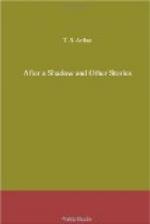Alice threw open the window, and then ran into the kitchen for some crumbs of bread. When she came back, pigeon was still on the fence. Then she called to him, holding out her her hand scattering a few crumbs on the window-sill. The bird was hungry and had sharp eyes, and when he saw Alice he no doubt remembered the nice meal she had given him in the morning, in a few moments he flew to the window, but seemed half afraid. So Alice stood a little back in the room, when he began to pick up the crumbs. Then she came nearer and nearer, holding out her hand that was full of crumbs, and as soon as pigeon had picked up all that was on the sill, he took the rest of his evening meal from the dear little girl’s hand. Every now and then he would stop and look up at his kind friend, as much as to say, “Thank you for my nice supper. You are so good!” When he had eaten enough, he cooed a little, bobbed his pretty head, and then lifted his wings and flew away.
He did not come back again. At first Alice, was disappointed, but this soon wore off, and only a feeling of pleasure remained.
“I would like so much to see him and feed him,” she said. “But I know he’s better off and happier at his own home, with a nice place to sleep in and plenty to eat, than sitting on a window-sill all night in a snow storm.” And then she would say over that sweet poem, “The City Pigeon,” which her mother had given her to get by heart. Here it is, and I hope every one of my little readers will get it by heart also:—
“Stoop to my window, thou beautiful dove!
Thy daily visits have touched my love.
I watch thy coming, and list the note
That stirs so low in thy mellow throat,
And my joy is high
To catch the glance of thy gentle eye.
“Why dost thou sit on the heated eaves,
And forsake the wood with its freshened leaves?
Why dost thou haunt the sultry street,
When the paths of the forest are cool and sweet?
How canst thou bear
This noise of people—this sultry air?
“Thou alone of the feathered race
Dost look unscared on the human face;
Thou alone, with a wing to flee,
Dost love with man in his haunts to be;
And the ‘gentle dove’
Has become a name for trust and love.
“A holy gift is thine, sweet bird!
Thou’rt named with childhood’s earliest
word!
Thou’rt linked with all that is fresh and wild
In the prisoned thoughts of the city child;
And thy glossy wings
Are its brightest image of moving things.
“It is no light chance. Thou art set apart,
Wisely by Him who has tamed thy heart,
To stir the love for the bright and fair
That else were sealed in this crowded air
I sometimes dream
Angelic rays front thy pinions stream.
“Come then, ever, when daylight leaves
The page I read, to my humble eaves,
And wash thy breast in the hollow spout,
And murmur thy low sweet music out!
I hear and see
Lessons of heaven, sweet bird, in thee!”




